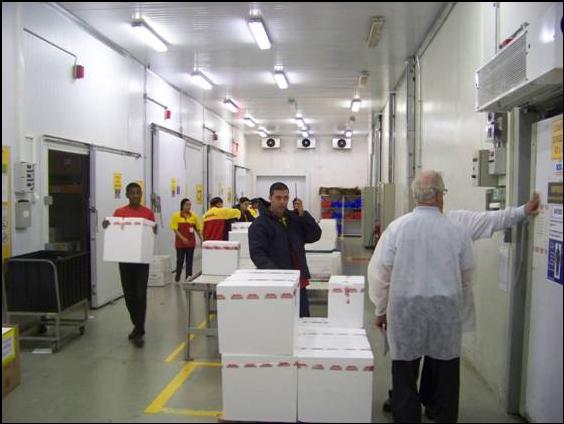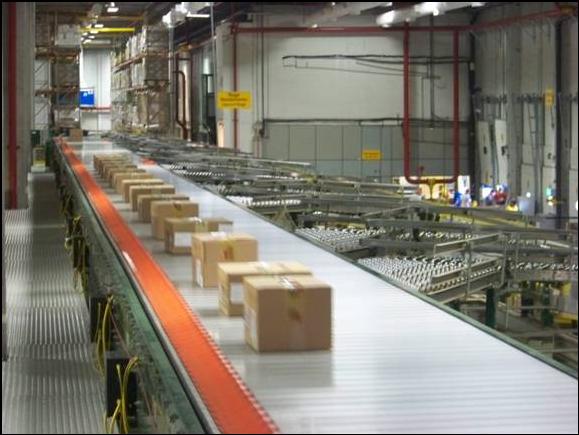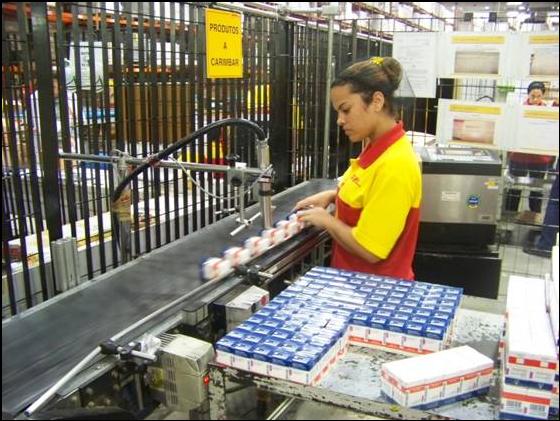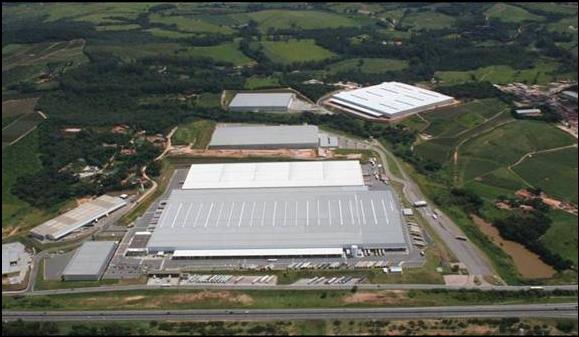Excelling with DSC
Brazil and Latin America Site Visit
June 8, 2011
By
Richard Armstrong
Attendees:
Douglas Tacla, Vice President Transportations Operations
Todd Yates, Vice President Retail-Consumer Operations Southern Cone
Rogério Mansur, Sr. Director Operations
Ricardo Ortiz Di Sério, General Manager Operations
José Rogério de Souza, Operations Director
Fabricio Chi Barreiro, Inventory Manager
Luís Baida, Operations Manager
Javier Loyola, Director Marketing & Strategy
DHL Supply Chain (DSC) is the largest third-party logistics provider (3PL) in Latin America. It has 14,500 employees and comprises 18% of the company’s Americas revenue. The table below covers some of the DSC basics in the region.
| Argentina | Brazil | Central America | Chile | Mexico | Panama | |
| Customers | 10 | 76 | 105 | 30 | 100 | 30 |
| Associates | 1,300 | 6,500 | 700 | 425 | 6,500 | 300 |
| DCs | 11 | 40 | 10 | 16 | 54 | 2 |
| Warehouse Space (square feet) | 125,000 | 700,000 | 20,000 | 75,500 | 800,000 | 114,000 |
Since 2000, the company has undergone rapid growth in the region. In Brazil, it has increased warehousing space by 10 times and its customer base significantly. In 2010 alone, the company added 15 new customers and experienced significant growth with existing customers throughout Mexico, Argentina, Brazil and Chile.
DSC launched a number of initiatives recently that strengthen its ability to meet changing customer needs across multiple industries
DSC has expanded multi-customer distribution operations to provide more efficient networks for domestic distribution. In Brazil, shipments can reach any point-of-sale in Sao Paulo in less than two days, and in three days for most other areas of the country. A review of one of its multi-client pharmaceutical operations is included in this report.
DSC is leveraging its packaging expertise to help leading consumer packaged goods companies in Brazil dispose of obsolete products due to damage, expiration or discontinuation. The company uses state-of-the-art equipment to deconstruct packaging in an environmentally friendly manner.
DSC is implementing its supply chain command and control (SC3) transportation system in Brazil. SC3 is a global program providing customers visibility to shipments throughout Latin America and the world. Part of the 3PLs transportation management service is highlighted below. This application was first deployed in Mexico and empowers businesses to better manage inventories, shipment lead times, delivery dates, freight costs and lane volume forecasts.
Why You Need a 3PL
DHL Supply Chain Transportation Management in Brazil and Latin America
Value-Adds, Governmental Mandates and Taxes
One of DSC’s largest Latin America operations is in Brazil where it employs over 6,500 people. In Brazil, 20% of its workforce have college degrees of which 2% have postgraduate degrees. 51% of the workforce is 20 to 29 years old. 4% of the employees work in transportation management; 9% are in the pharmaceutical operations. Both of these key areas reflect DSC’s size and scale advantages, allowing it to provide value-added services at a level few other 3PLs can compete with.
Transportation is a core competency in Brazil. The table below shows DSC’s top transportation customers by sector in Latin America.
|
Automotive Engineering & |
Consumer |
Technology |
Life Sciences |
Retail |
|
Ford |
P&G |
Samsung |
Pfizer |
Nike |
|
Volkswagen |
Unilever |
HP |
Abbott |
Carrefour |
|
Chrysler |
Kraft |
Nokia |
|
|
In Brazil, the governmental challenges to managing transportation are substantial. DSC manages carriers, handles proof of delivery management and settlement, plans routings, handles rates and develops solutions. Sounds like routine transportation management except for the consequences of governmental activity.
First among these is the impact of ANVISA, The National System of Sanitary Surveillance Agency. In addition to controlling production and marketing of drugs, devices and services, the agency has authority over transportation infrastructure used for the movement of drugs, devices, etc. As a result, the carriers, trucks and warehouses used by DSC have to be approved by ANVISA. To comply, DSC keeps track of truck licensing, inspection and insurance and has ultimate responsibility for compliance.
In addition to the ANVISA requirements, states require individual facility licenses under the Visa program. Much more problematic for transportation management, however, is the value-added tax, ICMS. ICMS is the tax on the circulation of goods, interstate and intercity transportation and communication services, even when the operation is initiated abroad.
The ICMS rates vary on average from 7% to 19% by state in Brazil. Certain states create incentives for particular industries by reducing ICMS rates on products. For example, Goias has a special incentive for manufacturing drugs and devices. In Manaus in the Amazon region, there is a free trade zone filled with brand name manufacturers of electronic gear and motorcycles/scooters. The tax free merchandise is shipped down the river in road containers on barges (about 700 miles over three to four days). Payloads, especially for healthcare products, are often limited by insurance limits on the value of cargos.
The value of goods and tax requirements are important considerations for DSC in managing transportation. The main freight bill document, the CTRC1, includes extensive information on the value of merchandise, financial notation, the tax on freight charges and, yes, information on the shipper, consignee, weight, pieces, etc.
The transportation manager juggles it all to find the best solution. Along the way he must get government approval for the shipment and two proofs of deliveries – one on the CTRC and one for the accompanying invoice.
A wise observer will note that all of these complications are advantageous to the 3PL. Most major international shippers are not interested in taking more of these complications in house.
DSC uses a host of software solutions including i2, Roadshow, Cheetah (Mexico) and Proprietary TM software to handle the current situation. As noted above, DSC has run Oracle’s (G-Log) in Mexico since 2009 and will implement the system in Brazil by the end of 2011, making it the first 3PL to utilize an industry-leading transportation management system in the country.
In Life Science, DSC will handle over 20,000 shipments with 34,000 invoices this year. On-time deliveries run 93% to 95%. Given the complexities, that looks pretty good. Here’s a breakdown of the Risk Management part:
Transportation – Risk Management Activities
Execute the detailed Risk Management Plan, in agreement with authorities and customers:
●Provide the most security with lowest impact in the operation;
●Ensure the rules of Risk Management and the maximum limits of value (respecting Insurance and Customer limits) are followed;
●Ensure the use of escorts whenever it is necessary;
●Select, inspect and hire vehicles that have traceability equipment.
Operational Prevention:
●Check the criminal/personal record of drivers;
●Check out and test the devices and knowledge of the traceability system;
●Check general vehicle conditions, electrical conditions, conditions inside the load; and all tests of sensors and actuators (mandatory accessories required by law).
Tactical Prevention:
●Act in a proactive way to prevent and stop robberies before they occur;
●Develop solutions and actions to address any hijacking situation;
●Record and analyze all data and continually enhance the prevention plan.
Life Sciences
DSC acquired Unidock’s in 2003, making it the largest healthcare provider in Brazil. DSC operates seven pharma distribution centers in Brazil delivering 26% of the healthcare market. Single-client, dedicated operations are conducted at:
|
Location |
Client |
Square Feet |
|
Osasco |
Becton Dickinson |
100,000 |
|
Louveira |
Sanofi-Aventis |
100,000 |
|
Araucaria |
Novo Nordisk |
100,000 |
The multi-client facility in Anapolis is located in Goias, a state with low value-added taxes. The facility is home to Roche, United Medical and B. Braun. Also, Lundbek, Rambaxy and Abbott are in the Rio de Janeiro distribution center.
DSC’s customer list is a who’s who of pharma and medical devices companies.
- Abbott
- Hypermarcas
- Becton Dickinson
- Lilly
- Biogen Idec
- Novo Nordisk
- Carestream
- Pfizer
- Covidien
- Roche
The jewel of DSC’s life sciences operations is at Ceci in the city of Barueri. Eighteen accounts from Abbott to Zodiac are served from Ceci. Pharmaceuticals include over the counter2, patented (10 year), generics and controlled drugs. Controlled drugs are limited to those that are identified by ANVISA to be dangerous and/or addictive.
Ceci has piece/unit, partial cases, full case picking and a limited amount of skidded shipments. It has automatic sortation with 14 conveyor chutes leading to dock locations. Ceci has 38,000 storage positions and 31,800 rack pallet positions. It operates 24 hours for five days and until 4 P.M. on Saturday. (Brazilian law forbids working on Sunday). Receiving is 7 A.M. to 7 P.M. and shipping is from 5 A.M. to 9 P.M. Between 9 P.M. and 5 A.M. access is restricted for security reasons. The location is fenced, with extensive TV camera coverage, and the guard shack has bullet proof glass.

The cold room has 1,800 pallet positions. The controlled substances area has about 2,000. There are two pick lines. Customer orders are run sequentially. Fastest moving A+B products are on a four tier island close to the shipping doors. The shipping docks are fenced off and loaders are contracted from a single supplier.
Much of the outbound from Ceci goes to five large wholesalers. Product for larger destinations is shipped in returnable wire cages with pallet size bottoms. The cages are high enough to fill trailers.

There are about 300 employees at Ceci including specialists. Fifteen people work in quality control including seven pharmacists. Twenty-two people work in customer service (normal workday is 9 to 10 hours). The load planning center has seven employees. Process improvement has two people and the IT center has six people. Order communications are by EDI (electronic data interchange). An important part of load planning is to control the maximum value of loads. Only half of the space on some trailers can be used because the insurable maximum has been reached. Escort cars accompany loads through the Sao Paulo and Rio metropolitan areas. Drivers have devices for immediate communication and equipment has security control features.

Some of the value-added services at Ceci are kitting, relabeling, repacking, ink jetting individual items with warning notices, sampling and export packaging. Deliveries in Sao Paulo are made using 33 small delivery trucks. Units in this dedicated contract carriage fleet are equipped with security features and go to hospitals and larger locations. They are GPS tracked and have delivery windows. Sales promotional materials are also distributed from Ceci.
A summary of activity for a major Ceci customer is given below:
Location: Barueri, Sao Paulo
Products: Drugs, pharma, hospital, perishable
Distribution Services: Full truckload, less-than-truckload
Markets Served: Domestic and some export
| Key Statistics | Systems | |||
| Pallet Stored Refrigerated | 200 | WMS | X | |
| Pallet Stored Dry | 3,200 | RF Enabled | X | |
| Numbers of SKUs | 1,200 | |||
| Full Cases Shipped Monthly | 40,000 | Special Tools | ||
| Case Picking Shipped Monthly | 5,100 | Sortation Equipment | X | |
| % Case Picking Shipped Monthly | 12.00% | |||
| Commercials | Storage Solution | |||
| Start Date | 1999 | Single Deep Racking | X | |
| On-time delivery | KPI | Cold Chain Products | X | |
| On-time and in-full | KPI | Control Products | X | |
| Variable – Activities | X | Temperature Control WHS | X | |
| Value-Added Services | SHE/Quality Program | |||
| Returns Management | X | Operational Improvement Plan |
X | |
| Kitting Promotional | X | SHE Master Plan | X | |
| Labeling/Over-labeling | X | Quality System | X | |
| Ink Jet print for Government Products |
X | |||
| Quality Control Sampling | X | Other Services | ||
| Export Packaging | X | Customer Service/Call Center |
X | |
Major Non-Pharma Operations
DSC has a large campus with four buildings in Louveira. Major customers are HP, Kraft, Sanofi-Aventis, Sky/Lenovo and Unilever.

Unilever is one of DSC’s largest Brazilian customers. It operates from seven locations with over 1,500 employees. Louveira is the largest location with over 1.3 million square feet. There are 117,000 pallet locations. Throughput (in and out) is 27 million pallets a year. Operations run 24/6. The warehouse is radio frequency-enabled. 70% of picks are pallets, 30% are cases. Brazil is Unilever’s second largest market. Among value-added services, DSC does labeling, repacking, bundling, kit assembly, lot control and returns.
For Nike, DSC handles footwear, apparel and accessories. The facility has 31,000 pallet positions. There are 24 dock doors and over 350 employees (with up to 100 extra during the peak season). Manhattan 5.8 is the WMS (warehouse management system), which was sourced by DHL and provides the functionality and flexibility for Nike to meet growth projections. The RF-enabled solution includes real time capability and meets fiscal requirements within the Brazilian market. This is a heavily each pick location with 48,000 SKUs (stock keeping units) and 2.6 million units shipped a month. 40% of shipments are made in the fourth quarter. Product is stored in pallet racks, bins, cage bins, small racks and flow racks. Return rates range from 3% to 7%.
Summary
DSC has a series of high quality value-added warehousing and transportation management operations in Brazil and Latin America. We have been impressed with the scale and level of the DSC/Exel operations we have seen whether in Asia, Latin America or North America.
1Conhecimento de Transporte Rodoviaro de Cargos
2Includes most U.S. prescription drugs like Levothyroxine.
Sources: A&A Primary Research, http://www.dhl.com/


